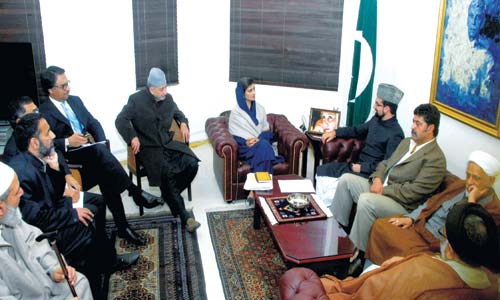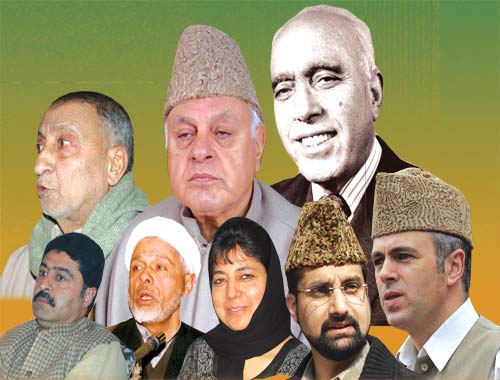Ever since the birth of Kashmir conflict, the leadership cutting across ideological divides have traditionally embarked on ambitious dispute- resolution trips to Islamabad. As the moderate Hurriyat delegation is flying back home, Shah Abbas analyzes the last six decades of fruitless forays.
When Hurriyat (M) delegation left to Pakistan for its third visit last week, there was no clarity about its agenda. But when its leaders got the opportunity, they spoke their hearts out which gave some idea about why they were in Pakistan and what was the agenda on which they were working.
In his characteristic tone, Professor Abdul Gani Bhat, a key leader of Hurriyat (M), who took part in a detailed discussion at the Institute of Strategic Studies of Islamabad (ISSI), said, “The somber reality is that a huge change has happened. We have to tame the change. India, in a bid to sustain its growth, may offer concessions and we must seize them. When we talk, we must introduce flexibility. It is part of negotiation. All sides must show flexibility. Even if we have to cut each others’ noses, let us do it in a way that the nose looks better than it was before.”
Hurriyat (M) chairman, Mirwaiz Umar Farooq did some Pakistan bashing at ISSI function, lambasting Islamabad for not taking Kashmiris on board in its talks with New Delhi. “We agree that intra-Kashmir CBMs should be strengthened but it should be in consultation with the people of Kashmir. It should not be a situation where we are told by the media that such and such decisions have been taken. When Srinagar-Muzaffarabad bus was started, the government of Pakistan should have taken the Kashmiri people into confidence. The freedom movement should have taken the ownership of the CBMs but instead, the PDP and NC took the ownership, claiming it to be the outcome of elections and India-Pakistan dialogue. You have to give Kashmiris a feeling of success; Kashmiris have to feel that it is because of their movement and their sacrifices that CBMs are taking place and that it’s a gradual process and ultimately it will lead to their success,” Mirwaiz said in his speech at ISSI.

The visit of Hurriyat leaders to Pakistan is not new. This process is as old as the Kashmir dispute itself which was born in 1947 when the Indian subcontinent was divided. From Sheikh Mohammad Abdullah, Ghulam Mohammad Sadiq and Mirza Mohammad Afzal Beigh, everybody in the list travelled to Islamabad to discuss the resolution process. Interestingly, the most powerful pro-Pakistan voice in Kashmir, Syed Ali Geelani, has never visited Islamabad after partition.
“Kashmiri leaders have been visiting Pakistan in order to find a solution to the Kashmir issue since 1947 and presently when Hurriyat leaders are in Islamabad, it has nothing new in it,” Historian, M Y Taing told Kashmir Life.
Hurriyat (M) leadership just concluded its third visit to Pakistan where it had marathon consultations vis-a-vis Kashmir issue and its resolution. Hurriyat (M) introduced two new faces in its delegation which visited Pakistan this time; Mukhtar Ahmad Waza and Mussadiq Aadil, apart from old faces like Mirwaiz Umar Farooq, Professor Abdul Gani Bhat,Moulana Abbas Ansari, Aga Syed Hassan and Bilal Gani Lone, who were part of the delegation.
Historian Dr Ishaq Khan opines that the dialogue between Kashmiris and Pakistan is an old process, but the situations were different from time to time. Initially both India and Pakistan, he says, recognized the issue but later the situation started to change till the present phase when India has to take a bigger decision.
“That was a time when India was ready to solve the issue but Pakistan demanded for the larger part of J&K which led to the failure of Suran Singh-Bhutto dialogue. Now Pakistan is ready for any solution and India is not even ready to talk. Solution lies in creative and sustained dialogue and it is the only way,” Dr Khan said.
“Apparently it is India which is behind the Hurriyat (M) leaders’ Pakistan visit. It seems that this time India is supporting the Hurriyat delegation visiting Pakistan which is a positive sign. Otherwise it would not have allowed them to travel to Islamabad,” Khan said.
Contrary to every Islamabad touring Kashmiri leader’s claims and after a time span of more than six decades which involved consultations and deliberations, the Kashmir issue stands where it was in 1947. Instead, many more humane and economic aspects of the issue have come to fore. —
















